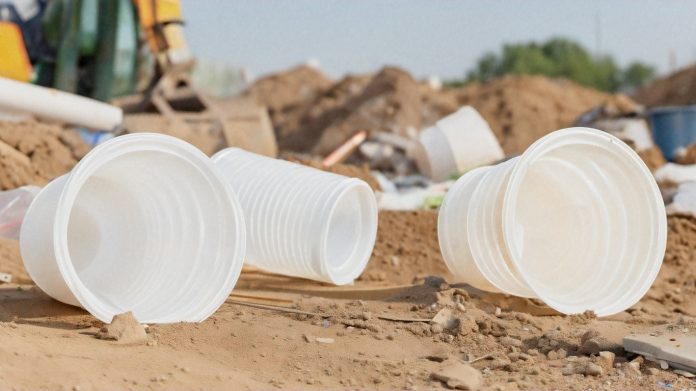The UK construction industry is rapidly becoming a significant contributor to plastic pollution, with new data highlighting its rising plastic waste output.
A recent analysis by the Copper Sustainability Partnership (CuSP) of European Commission data reveals a staggering increase in plastic waste generated by the UK construction industry.
While global attention has primarily focused on the packaging sector as the main source of plastic pollution, the building and construction sector—the second-largest end-user of plastics—has been largely overlooked.
Oliver Lawton, Co-founder of CuSP and Managing Director of Lawton Tubes, explained: “The research stands as stark testimony to the shift we have witnessed anecdotally in recent years, with suppliers and manufacturers drawn toward cheap plastic materials that are not fit for purpose.
“Contrary to the claims made by plastic manufacturers on the longevity of their products, construction plastics often perform poorly compared to traditional constructional materials, leading to breakages and failures that negate the immediate cost savings associated with plastics.
“At the end of a building’s life cycle, most plastic waste still isn’t recycled and is instead sent to a landfill, exported abroad or incinerated. Low recycling rates also necessitate new plastic products, leading to a linear cycle of production, use and waste.”
A sharp rise in plastic waste across UK construction
Between 2004 and 2018, the industry’s plastic waste grew at an average rate of 210% every two years.
This surge is 15 times faster than the rate observed in other European countries, where construction-related plastic waste increased by an average of 14% over the same period.
Across all UK industries, the average growth rate of plastic waste was only 4% every two years, underscoring the construction sector’s disproportionate impact.
Low recycling rates exacerbate problem
The recycling rates for plastics used in construction are alarmingly low. Post-consumer polyvinyl chloride (PVC), the most commonly used plastic in the industry, has a recycling rate of just 3% across Europe.
Compounding the issue, plastic composites such as multi-layer composite pipe (MLCP) are rarely recycled due to the complexities involved in separating their components.
In stark contrast, construction metals like steel, copper, and aluminium boast recycling rates of over 70%, highlighting a significant sustainability gap in the industry’s material use.
Co-founder of CuSP Andrew Surtees added: “In the plumbing sector, we have seen newer products like MLCP – a type of composite pipe that physically cannot be recycled – pushed by manufacturers as a sustainable option for installers and homeowners when the opposite is true.
“While most construction plastics are marketed as theoretically recyclable, in reality, only traditional buildings with a long-standing history of recovery and recycling will be made of recycled material and go on to be recycled at the end of their life cycle.
“With the UK construction industry falling further behind in its net zero commitments, phasing out plastics in favour of fully recyclable materials with proven sustainability credentials remains one of the biggest opportunities for sustainable growth in the sector.”
The rapid increase in plastic waste within the UK construction industry, coupled with the low recycling rates for materials like PVC and MLCP, underscores an urgent need for the sector to adopt more sustainable practices.
As the spotlight on plastic pollution intensifies, the construction industry must prioritise the use of recyclable materials and invest in innovative waste management solutions.
By doing so, it can not only reduce its environmental impact but also lead the way in creating a more sustainable future for the UK.





